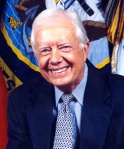Meanwhile, Nasser's posting from Bir Zeit swept through the Middle East.The posting first surfaced outside of Palestine in Cairo, Egypt's Al-Ahram. Other postings, with the same harsh headline, quickly went on line in Tripoli, Libya, London's Middle East on Line, Russia's Pravda, and Palestine's The Palestine Chronicle. Across the Atlantic, it ran on CounterPunch and on Montreal, Canada's Centre for Research on Globalization (CRG)'s site. (Click on each link to tour through Nasser's posting).
When Kerry initially asked participants for confidentiality, he appeared to be dropping a hint that he was working for a surprise ending. This lured some of us into hoping Kerry might revert to the fairness approach of the first President George Bush and his Secretary of State, James Baker. The choice by Kerry of Martin Indyk, former AIPAC staffer, as his point person pretty much scuttled that dream.
Of course, long gone are, dare we say it, the halcyon days of President Jimmy Carter, when a U.S. President really was an honest broker.
MJ Rosenberg recalls those days:
"The only successful U.S. mediation between Israelis and Arabs was conducted by President Jimmy Carter (above) at Camp David in 1978. Carter managed to bridge the gaps that had led Israel and Egypt to go to war three times previously by being the ultimate honest broker.
"In his book about Camp David, Gen. Moshe Dayan, who was then Israel's foreign minister, described how Carter would keep the pressure on both sides equally, telling President Sadat and Prime Minister Begin, in turn, that if the talks failed, he would publicly name who was responsible.
"All during the long, arduous process that produced a peace treaty that has survived 34 years, Carter refused to act as either side's advocate. His only client was peace and that is how he achieved an agreement."
For a time, it appeared that when he brought new leaders back to Camp David, Bill Clinton would keep his promises to Israel and the PLO. Alas, political expediency appears to have led Bill Clinton astray. Israeli peace activist Uri Avnery recalls what happened:
"In the past, the US has broken such promises without blushing. For example, before the Camp David meeting, President Bill Clinton gave Yasser Arafat a solid promise that he would blame neither side for a failure. (Since the meeting was convened without the slightest preparation, failure was predictable.)After the conference, Clinton put the blame squarely -- and wrongly -- on Arafat, a vile act of political opportunism, designed to help his wife get elected in New York."As it turns out, Clinton's wife did get elected to that Senate seat from New York, from which she moved on to serve as Secretary of State. She was succeeded by John Kerry, who is a victim of a changing, and increasingly dark, political landscape in which the Israel Lobby and the U.S. Congress leave him and President Obama little room to maneuver.
In his posting, Nicola Nasser referred to "concessions" Kerry asked of Abbas. This strongly suggests that Kerry had already gained what few "concessions" he could pry out of Netanyahu.For his part, President Abbas has, no doubt, given John Kerry his wish list for any future peace accord. The easiest wish Netanyahu could grant is a grudging release of Palestinian prisoners. Netanyahu will play with the prisoners like they are poker chips. He will hold them until he decides to release some "in stages" throughout the negotiations.John Kerry should be able to deliver his promises of Palestinian economic development, which is certainly needed. But what sort of economy can be developed under the restraints of an internationally illegal military occupation? What about the rebuilding of the Palestinian airport in Gaza? An airport is always helpful for a nation's trade purposes. Don't count on it.
A major Palestinian demand for reaching some sort of peace agreement is the end of all illegal Israeli settlement growth. Not a chance. Israel plays the peace process game not to give away ill-gotten gains, but to protect them.So where can this peace gathering go? It remains an outside possibility that strong voices within the Palestinian leadership will refuse to let Abbas give in to the U.S. bullying tactic. But thus far, limited prisoner release and additional economic development are strong incentives to send Mahmoud Abbas on yet another hat-in-hand journey to pick up what benefits are promised him.On the day before the Washington talks were set to begin Monday, some of the strong voices voiced their disapproval of the talks. The Palestinian news agency Ma'an reported on demonstrations in Ramallah."Hundreds of Palestinians marched in Ramallah on Sunday to protest a return to negotiations with Israel. Demonstrators marched from the city center towards President Abbas' headquarters in the Muqata, chanting slogans condemning the Palestinian Authority's decision to return to talks.
"Four Palestinian Authority police officers and three protesters were injured when both sides clashed during the march, which was organized by the Popular Front for the Liberation of Palestine.
The picture at top of Abbas and Kerry, is by WAFA. It appeared in The Palestine Chronicle.(Note: You can view every article as one long page if you sign up as an Advocate Member, or higher).

Kerry Stumbles Into a Peace "Bully" RoleBy James Wall (Page 2 of 2 pages) Become a premium member to see this article and all articles as one long page. 1 comment
|
|
| Rate It | View Ratings |
James Wall served as a Contributing Editor of The Christian Century magazine, based in Chicago, Illinois, from 1999 through 2017. From 1972 through 1999, he was editor and publisher of the Christian Century magazine. Many sources have influenced (more...)

OpEdNews depends upon can't survive without your help.
If you value this article and the work of OpEdNews, please either Donate or Purchase a premium membership.
If you've enjoyed this, sign up for our daily or weekly newsletter to get lots of great progressive content.
Most Popular Articles by this Author: (View All Most Popular Articles by this Author)
Does Israel Interfere in US Elections?
New York Times Flacks for Jewish Groups Against 15 Major Christian Leaders
How Iran Could Be The Next Neocon Target
Ten Swing States Could Decide the 2012 Election; Obama Leads in Nine of Them
White Evangelicals Stifle Values For Trump
What Protestants Could Learn from Ron Paul
To View Comments or Join the Conversation:




